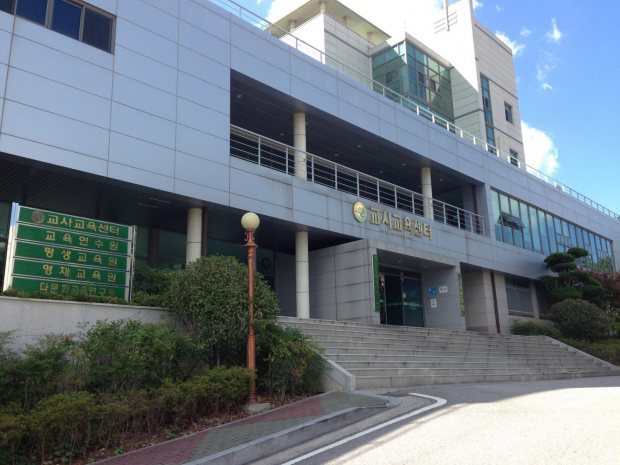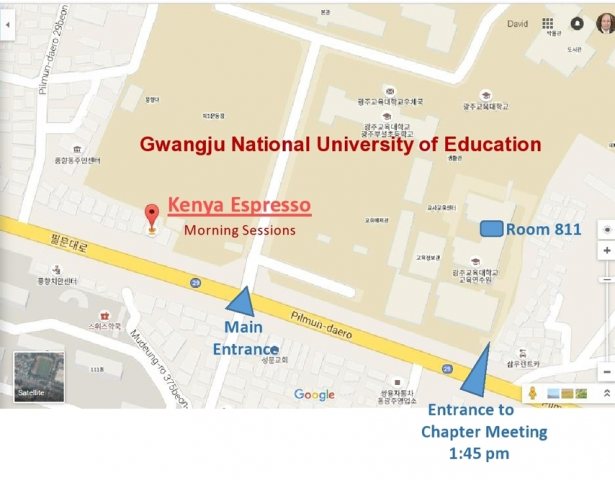
Gwangju-Jeonnam Chapter July Meeting
.
––– Morning Korean Help Cafe –––
New Time: 11:15 - 12:15 am (Sat., July 9). Late arrivals are still welcome.
Location: Kenya Espresso Cafe, near GNUE. (The 2nd building from GNUE main gate, towards E-mart. Map at bottom.)
Bring your questions about the Korean language.
Target group: High-Beginner to Low-Intermediate.
David Shaffer at the Help Table. Casual format.
––– Morning Reflective Practice Session –––
No Reflective Practice session this month.
––– MAIN MEETING SCHEDULE –––
Time: Saturday, July 9, 2016, 1:45 - 5:00 pm
Location: Gwangju National University of Education (GNUE), Teacher Training Center (교사교육센터) 1st Floor; Room 811. Detailed directions HERE.
1:45 pm: Sign-in and Meet-and-Greet (Admission is free. Future membership is welcomed.)
2:00 - 2:30 pm: Presentation
English Teachers’ Emotional Labor, Discrete Emotions, and Classroom Management Efficacy
Mikyoung "Miky" Lee
2:30 - 2:45 pm: Refreshment Break
2:45 - 4:00 pm: Collaborative Workshop
Topics in Education: Ramifications for the EFL Classroom
Matthew Ehlers
4:10 - 4:45 pm: Swap-Shop Presentations
Share your Teaching Ideas, Classroom Activities, and Teaching Wisdom with the group.
(Everyone is encouraged to share. Short tidbits are welcomed. Handouts also welcomed.)
4:45 - 5:00 pm: Announcements / Drawing for Door Prizes / Closing
––– After-meeting dinner at The First Alleyway, downtown –––
Presentation Summaries and Presenter Bio-sketches
.
Collaborative Workshop
Topics in Education: Ramifications for the EFL Classroom
Matthew Ehlers, Facilitator
In this workshop, you will have the chance to discuss research in learning and using second languages with other KOTESOL members.
The five topics that we will look at in today’s workshop are as follows:
–– How using hand gestures and body language can help your students better understand you.
–– What boredom means, as well as why it can cause you problems.
–– How language may be a kind of music, and how you could use this.
–– Why your students need to do activities, in addition to reading their textbooks or watching you lecture, to learn what you’re teaching them.
–– Why the accent you use to teach English matters.
(Links to the full articles, a summary of each, and questions for discussion are contained in the PDF attached at the bottom of this page. Come to the meeting prepared to discuss.)
At the beginning, you will have a few minutes to decide which topics you wish to discuss and collect your thoughts. After that, you will go to one of the five discussion groups to discuss the topic you selected, including how you could use it in your classes. Around 15-20 minutes later, you will have the chance to go to another group, to talk about another topic you find interesting, and to also discuss ways that you could use it, when working with your students. Time permitting, a third and fourth topic will be discussed.
If you want to stay in one group for longer, or if you want to work by yourself, that’s ok, too: today’s workshop is about your professional development.
At the end, there will be time for whole group discussion on the five topics, including what they mean for the individual, and how they can use them in the classroom.
The Presenter
Matt Ehlers has a bachelor’s degree in Business Administration (emphasis: International Business) from Bacone College in Muskogee, Oklahoma, though he also studied civil engineering at the University of Missouri-Rolla for four and a half years. He has been a teacher for close to eight and a half years: two and a half as a high school (O-level) math teacher in Tanzania (where he served as a Peace Corps Volunteer), one year at an English-language hagwon in Busan, and close to five as a middle school EFL teacher in Gwangju (with EPIK). In his classes, he tries to apply research that he reads, as well as insights he has gained from learning Spanish, Swahili, and Korean. Matt believes that education can be the cure for ignorance, and that each person has to figure out how they learn best. In his spare time, he likes reading, taking pictures, and traveling.
____________________
English Teachers’ Emotional Labor, Discrete Emotions, and Classroom Management Efficacy
.
Mikyoung Lee
With a steady increase in studies regarding teachers’ emotions, researchers have realized that emotion management can be considered as an integral part of a teacher’s skill-set. It is crucial for teachers to find appropriate strategies for emotion management because managing emotions has been seen as essential in effective teaching. Extending research on teachers’ emotions beyond general educational contexts and Western samples, I examined how teachers’ emotions correlated with their emotional labor strategies and classroom management self-efficacy with an East-Asian sample in an English teaching context (127 Korean non-native English-speaking teachers). The results showed that surface acting (emotional expressions modification) correlated positively with anxiety and frustration, whereas deep acting (internal feelings modification) correlated positively with enjoyment and pride and negatively with anxiety. Enjoyment and anger correlated positively and frustration negatively with classroom management self-efficacy. Furthermore, enjoyment and frustration were documented as mediators in the relationship between emotional labor strategies and classroom management self-efficacy. The findings suggest that deep acting is linked to experiencing positive emotions, which in turn is positively related to classroom management self-efficacy, whereas surface acting is linked to experiencing negative emotions, which in turn relates negatively to classroom management self-efficacy. This study is meaningful since it investigated the relationships between English teachers’ emotional labor strategies, emotions, and classroom management self-efficacy, considering that there are no previous studies in the language teaching context. The finding that English teachers’ emotions might explain the association between emotional labor strategies and classroom management self-efficacy highlights the importance of empirical attention on their discrete emotions. Theoretical and educational implications will be further discussed.
The Presenter
 Mikyoung Lee received her PhD in Educational Psychology at the University of Munich, her MA in TESOL at Sookmyung Women’s University, and her BA at Yonsei University. She had taught English for 8 years in Korea, mainly at the Ajou University, Suwon. Currently she is a Guest Researcher in the Department of Psychology at the University of Munich, Munich, as well as a Special Lecturer in the Graduate School of Teaching Foreign Languages at Ewha Womans University and the Graduate School of TESOL at Sookmyung Women’s University, Seoul. Her main research interests are language acquisition, achievement goals and emotions, and teacher emotions and emotional regulation. She has presented her research at the International Conferences such as American Educational Research Association, European Association for Research on Learning and Instruction, and KOTESOL. She has also been publishing book chapter writings and research papers to the international journals, regarding students’ motivation and emotions in foreign language learning, teachers’ emotions and emotional labor, non-native English-speaking teachers’ anxieties, culture and language learning, and so on.
Mikyoung Lee received her PhD in Educational Psychology at the University of Munich, her MA in TESOL at Sookmyung Women’s University, and her BA at Yonsei University. She had taught English for 8 years in Korea, mainly at the Ajou University, Suwon. Currently she is a Guest Researcher in the Department of Psychology at the University of Munich, Munich, as well as a Special Lecturer in the Graduate School of Teaching Foreign Languages at Ewha Womans University and the Graduate School of TESOL at Sookmyung Women’s University, Seoul. Her main research interests are language acquisition, achievement goals and emotions, and teacher emotions and emotional regulation. She has presented her research at the International Conferences such as American Educational Research Association, European Association for Research on Learning and Instruction, and KOTESOL. She has also been publishing book chapter writings and research papers to the international journals, regarding students’ motivation and emotions in foreign language learning, teachers’ emotions and emotional labor, non-native English-speaking teachers’ anxieties, culture and language learning, and so on.
__________________________________________________
Photo: The Gwangju National University of Education (GNUE / 광주교육대학교), Teacher Training Center (교사교육센터), venue for our main meeting - 1st floor, Room 811.


| Attachment | Size |
|---|---|
| 291.28 KB |


